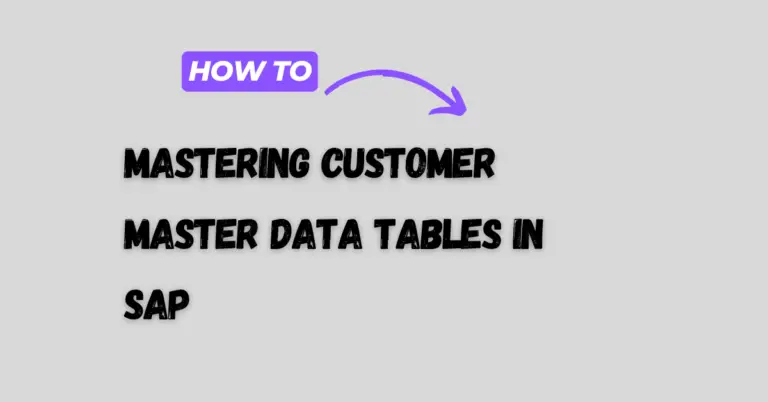A Comprehensive Guide to Sales Order Tables in SAP
SAP (Systems, Applications, and Products in Data Processing) is an enterprise resource planning software used by many organizations worldwide. One of its key functionalities is managing sales orders, which involves various tables that store relevant data. This guide aims to introduce you to the primary sales order tables in SAP, explain how they are interconnected, and provide examples of SQL queries to extract different types of information.

Key Sales Order Tables in SAP
- VBAK (Sales Document: Header Data)
- This table contains header information for sales documents such as the order type, sales organization, and customer details.
- VBAP (Sales Document: Item Data)
- This table holds item-level data for sales documents, including product details, quantities, and pricing.
- VBEP (Sales Document: Schedule Line Data)
- This table includes schedule line data, which specifies delivery dates and quantities for each item in the sales document.
- VBKD (Sales Document: Business Data)
- This table stores business-related data for the sales document, such as billing and shipping details.
- VBBE (Sales Requirement)
- This table contains sales requirements, including information about material availability and requirements planning.
- VBFA (Sales Document Flow)
- This table tracks the flow of sales documents, showing how documents are related to each other (e.g., sales orders linked to deliveries and invoices).
- VBLB (Sales Document: Release Order)
- This table holds data related to release orders, which are orders that have been released for delivery.
- VBPA (Sales Document: Partner)
- This table includes data about the partners involved in the sales document, such as sold-to, ship-to, bill-to, and payer parties.
How These Tables Are Interconnected
The sales order tables in SAP are interconnected through common key fields. Here’s how they typically relate to each other:
- Sales Document Number (VBELN): This is the primary key that links the header table (VBAK) with item (VBAP) and schedule line tables (VBEP).
- Item Number (POSNR): This key connects the item table (VBAP) with the schedule line table (VBEP).
- Document Flow (VBFA): This table uses the sales document number to trace the relationship between different documents (e.g., sales order to delivery).
- Partner Functions (VBPA): The sales document number also links the partner table (VBPA) to the header table (VBAK).
Learn more about Open Sales Order table in SAP
Example SQL Queries
- Retrieve Basic Sales Order Information
To get basic sales order information, including header and item details, you can join VBAK and VBAP:
SELECT
VBAK.VBELN AS Sales_Order,
VBAK.KUNNR AS Customer,
VBAK.AUART AS Order_Type,
VBAP.POSNR AS Item_Number,
VBAP.MATNR AS Material,
VBAP.MENGE AS Quantity,
VBAP.NETPR AS Net_Price
FROM
VBAK
JOIN
VBAP ON VBAK.VBELN = VBAP.VBELN
WHERE
VBAK.VKORG = '1000'; -- Sales Organization
- Retrieve Delivery Schedule Information
To get the delivery schedule for sales order items, join VBAK, VBAP, and VBEP:
SELECT
VBAK.VBELN AS Sales_Order,
VBAP.POSNR AS Item_Number,
VBEP.ETENR AS Schedule_Line,
VBEP.EDATU AS Delivery_Date,
VBEP.MENGE AS Schedule_Quantity
FROM
VBAK
JOIN
VBAP ON VBAK.VBELN = VBAP.VBELN
JOIN
VBEP ON VBAP.VBELN = VBEP.VBELN AND VBAP.POSNR = VBEP.POSNR
WHERE
VBAK.VKORG = '1000'; -- Sales Organization
- Retrieve Partner Information for Sales Orders
To retrieve information about the partners involved in sales orders, you can join the VBAK and VBPA tables. This will provide details about the different partner functions associated with each sales order:
SELECT
VBAK.VBELN AS Sales_Order,
VBPA.PARVW AS Partner_Function,
VBPA.KUNNR AS Partner_Number
FROM
VBAK
JOIN
VBPA ON VBAK.VBELN = VBPA.VBELN
WHERE
VBAK.VKORG = '1000'; -- Sales Organization
- Track Sales Document Flow
To trace the flow of sales documents (e.g., from order to delivery to invoice), query the VBFA table:
SELECT
VBFA.VBELN AS Preceding_Document,
VBFA.VBELV AS Subsequent_Document,
VBFA.VBTYP_N AS Subsequent_Document_Type
FROM
VBFA
WHERE
VBFA.VBELN = '5000001234'; -- Sales Order Number
Conclusion
Understanding the structure and relationships of SAP sales order tables is crucial for extracting meaningful data from the SAP database. The tables VBAK, VBAP, VBEP, VBKD, VBBE, VBFA, VBLB, and VBPA each hold specific pieces of information that, when combined, provide a comprehensive view of sales order data. By mastering the joins and key fields, you can write efficient SQL queries to retrieve various types of information, aiding in better data analysis and decision-making.
BSEG table in SAP might be interested for you.



2 Comments
Comments are closed.